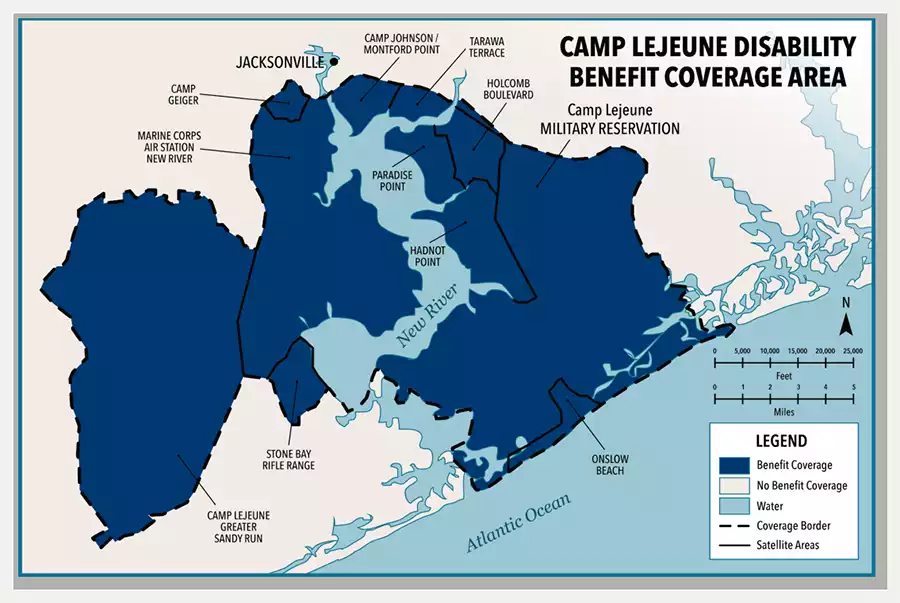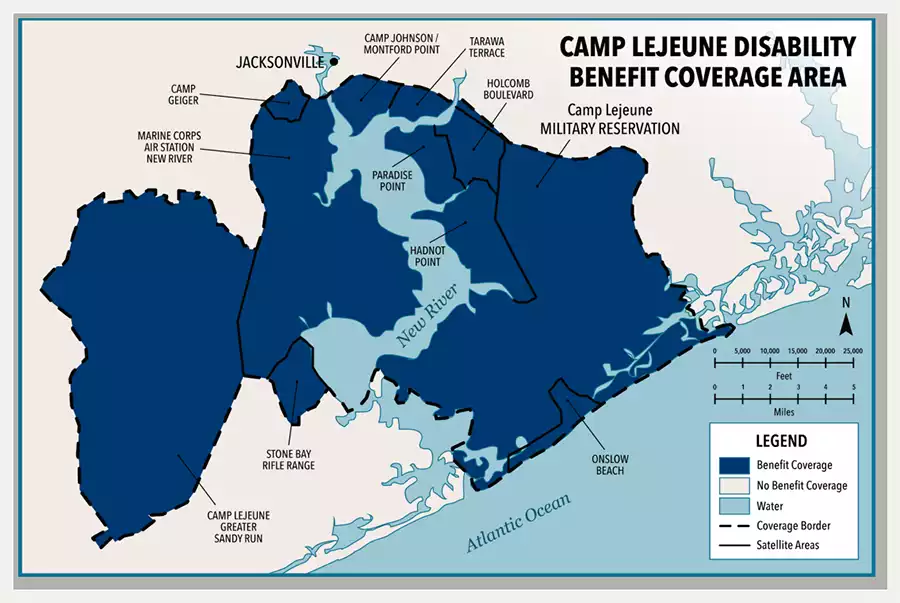Posted by : ZeroRisk Cases Marketing
From 1953 to 1987, water contamination was a major problem at Marine Corps Base Camp Lejeune, Jacksonville, North Carolina. The issue was so severe that it even led to a health warning. It is not known when the problem started, but it was there for decades. Here are some of the causes of the contamination and what you can do to prevent it. This problem has been linked in part to TCE, benzene, and lead.

Benzene
One of most alarming results from the recent Camp Lejeune water pollutant study on benzene is the finding that Marines were more likely to be exposed than civilians. This is because the Marines tended to bathe more often than civilians. As a result, they probably received the highest exposures from drinking the water. People living on the base could also be exposed by direct skin contact or inhalation.
Researchers from Agency for Toxic Substances and Disease Registry(ATSDR) concluded that Camp Lejeune residents drank benzene and others harmful chemicals. These chemicals, known as VOCs, leached into the water treatment plants over decades. VOCs have been shown to increase the risk of cancer, birth defects, or neurological effects.
Benzene is an organic chemical that is found naturally in the environment and is used in many household items. It can be a carcinogen and cause serious health problems. Perchloroethylene also refers to the chemical. Benzene can be found in water supplies in many parts of the world. It can be found in natural resources, such as cigarette smoking and volcanic gases. Despite the many risks, toxic chemicals can be found in low-lying areas. This includes water sources such as streams and rivers. The federal government has agreed that $2 billion will be paid to veterans affected by the toxic chemicals.
However, further research is needed to determine the health consequences of benzene in Camp Lejeune water. Unfortunately, data quality and availability are not sufficient to make a definitive assessment on the health effects these chemicals have on the human body. It is unlikely that further studies can reach conclusive conclusions. The committee’s report was designed to identify possible consequences as well as make recommendations. This report has been published by the New York Times.
One of the many health risks associated with Camp Lejeune’s polluted water is the increased chance of developing bladder cancer. The risk of bladder cancer in men is higher than that in women, and it is related to environmental exposures as well as smoking status and age. If they were exposed, those who served on the military base may be eligible to receive disability benefits. If bladder cancer is diagnosed in you or someone close to you as a result Camp Lejeune’s water contamination, you may be entitled for compensation.
Veterans are entitled to compensation due to exposure to benzene and other chemicals in the water supply. The law provides compensation for veterans and other Camp Lejeune residents who lived from 1953 to 1987. Both the CDC, and the American Cancer Society both published reports indicating a higher risk of multiple diseases including cancer and liver disease from drinking contaminated groundwater.
TCE
For those who were exposed to TCE and other contaminants in Camp Lejeune’s drinking water, military personnel or others with cancer and other medical conditions may be eligible for compensation. This law would also apply to National Guard and reservists who served at the base in the 1980s. Veterans may also be eligible for compensation as they are at risk of contracting non-Hodkin’s lymphoma and other cancers, often caused by TCE contamination.
It is unknown how much TCE had an impact on the health of Camp Lejeune Service members. However, studies suggest that TCE exposures may have been greater than those living off base. TCE exposures can be traced back to water contamination, but people who lived on base were likely to have had the most severe skin contact and inhalation.
TCE and PCE can be used in dry cleaning and greasing. These chemicals are also found in plastics and synthetic fibers as well as detergents. Exposure to PCE or TCE may increase your chance of developing liver and kidney cancer. The risk of developing non-Hodgkin’s lymphoma (non-Hodgkin’s) and cervical cancer could also be increased if you are exposed to these compounds. These chemicals can also be used in the manufacture of synthetic fibers and nylon.
The Camp Lejeune water contamination may be related to a history and other medical conditions that have affected Marines and their family. The contamination of water at Camp Lejeune’s water treatment plant dates back as far as the 1950s. Federal officials have known about the problem for decades. They have been working diligently to correct the problem. Despite the fact that the source of the contamination is unknown, Camp Lejeune’s water remains contaminated.
Despite the fact Camp Lejeune’s history of contamination has affected many people, no conclusive studies have been done on the health impacts of TCE/water contamination at the base. To understand the health effects of TCE, water contaminants in the water supply, further research is required. The U.S. Navy asked the National Research Council for assistance in this area. The NRSC gathered a multidisciplinary panel of experts with expertise across the fields of toxicology and epidemiology as well as biostatistics.
The Agency for Toxic Substances and Disease has studied the Camp Lejeune water contamination and has published several pages on the subject. The findings indicate that TCE and water contamination at Camp Lejeune likely increased the risk of cancer, adverse birth outcomes, and other health effects. Camp Lejeune is the most severe case of contamination in American history. In fact, the base was established in 1942. The discovery of specific VOCs occurred in 1982.
Looking for the highest quality Camp Lejeune cases?
CALL 833-937-6747 OR USE OUR REQUEST A QUOTE FORM.
ZeroRisk Cases, LLC
833-ZERORISK (833-937-6747)
ma*******@***********es.com


Recent Posts
- Valsartan Lawsuits Update 2024
- PFAS Litigation Update September 2024
- Latest Developments In Zantac Lawsuit
- EPA Cracks Down On Polyfluoroalkyl Substances PFAS
Categories
- Camp Lejeune
- Client Acquistion
- Client Financing
- Company Business
- Daily Dose of Law
- Digital Display Advertising
- Google Maps Ranking
- Human Trafficking
- Law Firm Info
- Lead Generation
- Litigation Funding
- Mass Tort News
- Mass Tort Signed Cases
- Personal Injury Leads
- Sex Abuse Cases
Archives
- September 2024
- July 2024
- June 2024
- May 2024
- April 2024
- February 2024
- January 2024
- December 2023
- November 2023
- October 2023
- September 2023
- August 2023
- July 2023
- January 2023
- December 2022
- November 2022
- October 2022
- September 2022
- August 2022
- June 2022
- May 2022
- April 2022
- March 2022
- February 2022
- January 2022
- December 2021
- November 2021
- October 2021